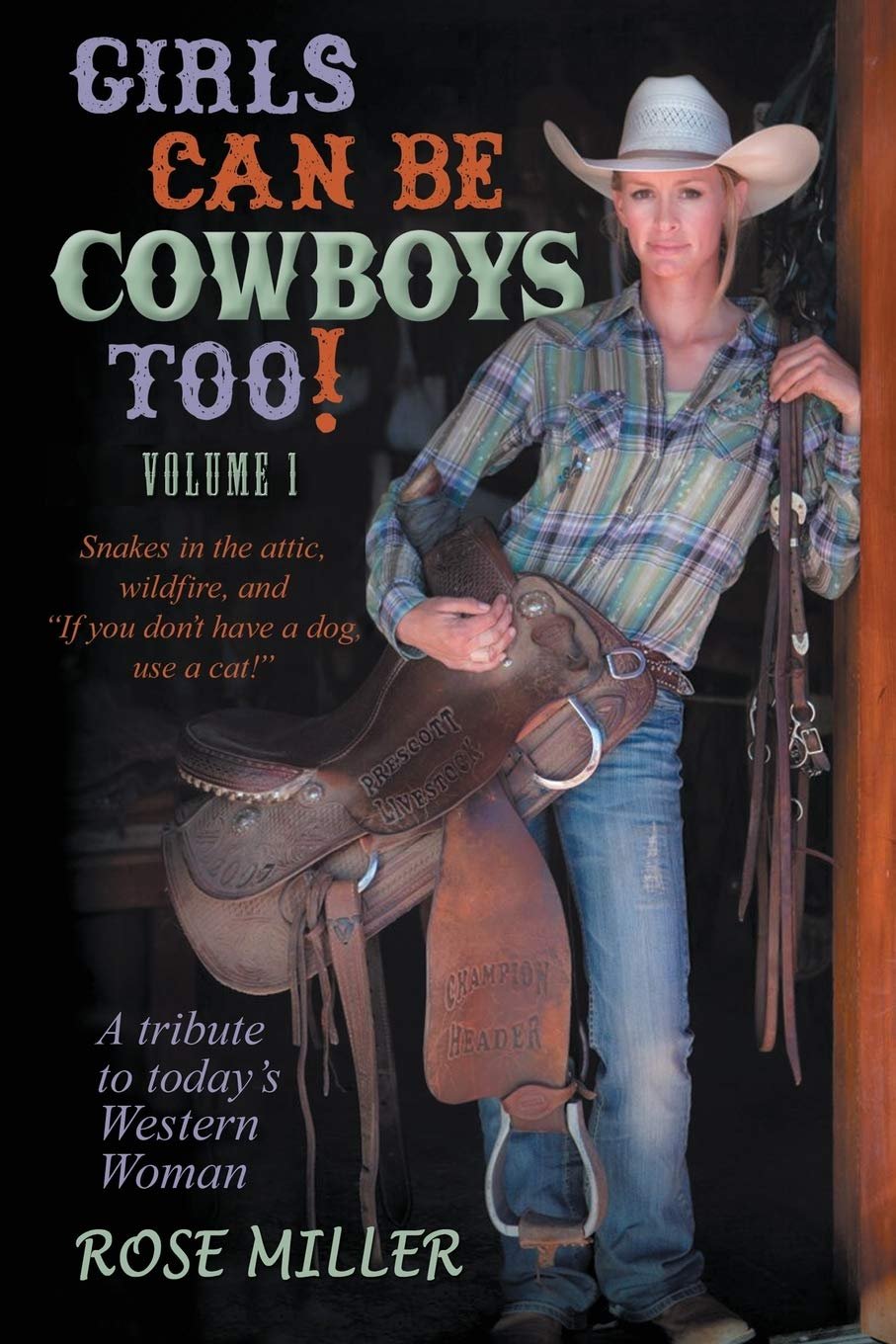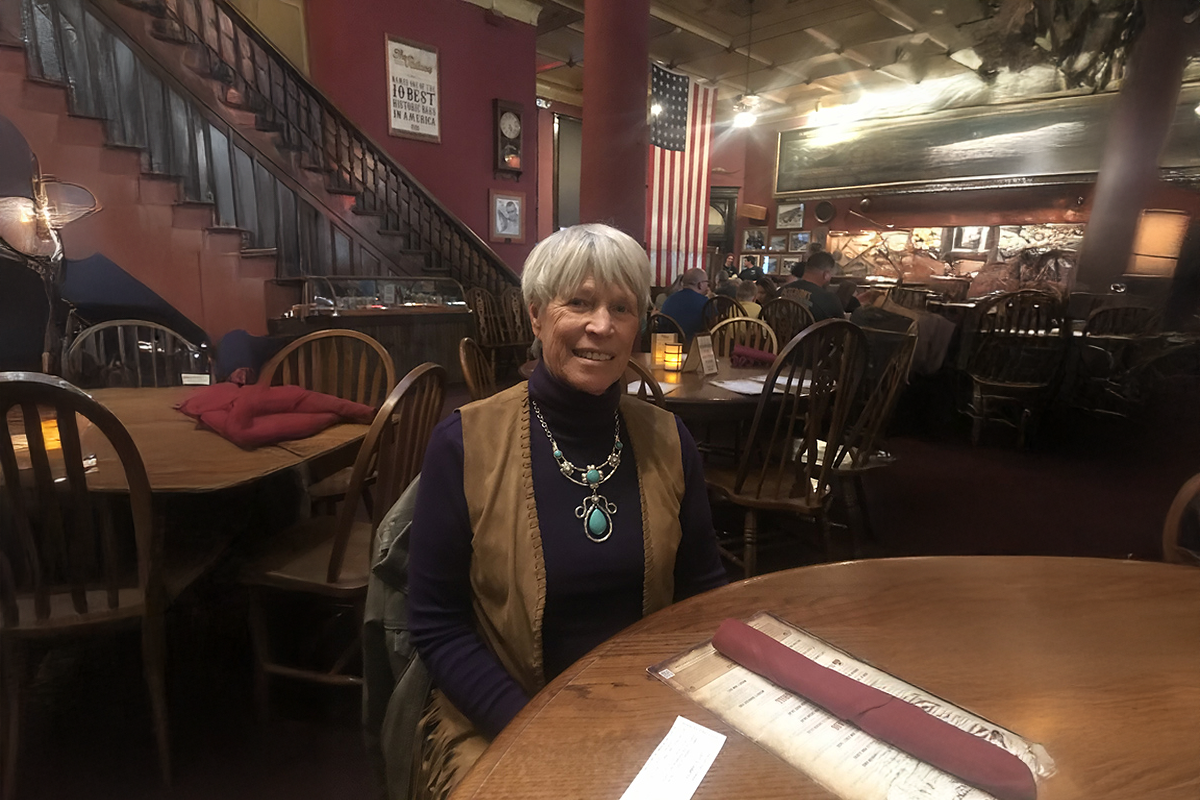PHOTO: Rose Miller, author, artist, and lifelong animal advocate, pictured at home in Prescott, Arizona, surrounded by the spirit of her beloved animals.
Stories Of Animals Love Loss And Strength
Rose Miller reflects on her life with animals, from Tennessee Walking Horses to mules and dogs, and celebrates strong Western women in heartfelt, authentic stories filled with wisdom, love, and resilience.
Rose Miller’s life has been shaped by animals and the landscapes that nurtured them. Growing up on a Pennsylvania farm and later raising her family on a horse farm in Indiana, her world has long revolved around horses, mules, dogs, and the bonds of care and companionship they demand. Her journey is not only one of training, breeding, and showing but also of listening—listening to the quiet wisdom of creatures who teach patience, resilience, and joy.
Her books, from The Horse That Wouldn’t Trot to Mules, Mules and More Mules and Always Have a Dog in Your Life, reflect a storyteller deeply rooted in lived experience. Written with warmth and candour, they capture the beauty, challenges, and heartbreak of a life shared with animals. With her latest work, Girls Can Be Cowboys Too!, she turns her gaze to the indomitable women of the West, gathering their voices into a chorus of strength and authenticity.
What makes Miller’s writing resonate is its sincerity. She writes not as a distant observer but as someone who has mucked stalls, tended foals, and grieved beloved companions. Her prose invites readers into a life where animals are not merely possessions but partners, teachers, and, at times, healers.
Through every page, one senses her unwavering respect for the natural world and for the people whose lives are bound up with it. Her words remind us that stories of horses, mules, and dogs are never only about animals—they are about love, loss, endurance, and the enduring hope that keeps us turning toward the next chapter.
What first inspired you to begin writing about animals, particularly mules and horses, in such a personal and conversational style?
In the 1960’s it was usual for a woman to marry and have a family. But I really wanted to be a veterinarian. My oldest daughter was a top career gal, and I lamented to her I felt lacking in the accomplishment field. She replied that my life was full of successes and encouraged me to write them down. She passed away from breast cancer before I did that, but I could feel her encourage me from “The Other Side” and one day I began to write from the heart. The books about our horses, mules and dogs are the result. I love telling stories about our animals, so writing in the conversational style was perfect.
How did your transition from raising and showing Tennessee Walking Horses to owning mules affect your outlook on animal companionship and training?
In 1970 our first horse was for daughter Sharon. Eventually, another was added and we rode for fun. When I discovered trotting hurt my back and found Tennessee Walking Horses, I got serious about promoting my new-found breed and it became “a job.” Breeding, handling stallions, helping a mare foal, teaching that foal how to be a show horse was challenging and rewarding but lots of work. Both horse and rider put in the hours. We were athletes! Owing a mule was different. Now it was back to fun. Safe fun. Horses, especially those bred for the showring could be nervous on the trail. Mules were supposed to be safe…they thought before they acted. (Usually.) Their outlook on life was so totally different from my horses, that I had to write the mule book as my life with them unfolded. I was fascinated, and off on a new journey. “Mules, Mules and More Mules.”
“What shocked me most was seeing
what man would do to a horse for a blue ribbon and money.” – Rose Miller
What were some of the most surprising or challenging differences you discovered between horses and mules?
Horses are reactive. Their flight instinct is high. Get out of danger and fast! Mules take more after their donkey sires; they look at a situation and think about it. If you have a good mule, this is definitely true. They do think more than a horse, in my opinion. Sometimes this is not to the owner’s advantage. For instance, if a mule has an accident in a horse trailer, he not only will not want to get in another one, but he also remembers who put him in one. They can carry grudges and act on them, sometimes months afterwards. However, if you and your mule respect and love each other, they will forgive. Horses are much more forgiving. Not everyone should own a mule!
The Horse That Wouldn’t Trot, you discuss the harsh realities of soring—how did sharing that truth affect you personally and as an author?
This book was written in 2009, and was my first. Seeing first-hand what man would do for a blue ribbon and money was horrifying to me. I loved my horses and I wanted that blue ribbon also. How was it fair that a person would be cruel and cause pain for glory, and another would show a horse and get nothing? That truth made me and others like me angry. The book was my way of sharing that anger with the hope of stopping those actions. Believe it or not, it is now 2025 and with many others still working to stop soring, it remains. What did happen was a different organization was started for horse lovers like me, to show horses on a level playing field with zero tolerance for soring.
“These women rock—strong, fierce,
and independent. They embody the spirit of the West.” – Rose Miller
Your books feature many strong, independent women from rural and ranching backgrounds. What drew you to their stories, and how did you gain their trust?
When we moved to Arizona from Indiana, I contacted neighbors who were ranch gals, met, and we started talking. Trust was instantaneous. If you loved animals, you were a friend! I loved all aspects of writing these two books. Traveling with a friend to their ranches, or interviews over the phone, taping the conversations and then writing was a joy. These women rock! “Girls Can be Cowboys Too!”
Losing beloved animals is a recurring theme in your work—how do you approach writing about grief, and what do you hope readers take away from those stories?
Life is hard in some aspects. But you must continue doing what you love, follow your calling, your heart. If animals are a part of that, loss is inevitable. In my dog book: “Always Have a Dog in Your Life,” that message is clear because it is easier to have more dogs than horses or mules. They come, you love, you lose them, you mourn, but you remember them and keep an open place in your heart for the next ones who will heal your soul again, and again.
Life is hard in some aspects. But you must
continue doing what you love, follow your calling, your heart. – Rose Miller
Which of your animals—dogs, horses, or mules—taught you the most about yourself?
Probably the dogs because in 50 years we have had 25, purebreds and rescues.The veterinarian support and knowledge has changed in 50 years. What we can do now to help a dog is marvelous. Being financially able to do more at this point is also wonderful. The thing that never changes is “When to say Good-bye.”
What advice would you give to other authors who want to write heartfelt, authentic stories based on real-life experiences?
Well,the easy thing to say is, “write from your heart.”This you must do, but I used my scrapbooks/pictures! The pictures helped me remember the stories. You need a good friend who will be honest and give feedback. I personally like “just the facts” and not a lot of fluff. It is said, you write the kind of stories you like to read, and in my case, that is truth.
EDITOR’S CHOICE
Girls Can Be Cowboys Too! is an inspiring collection of captivating, heartfelt stories celebrating strong, resilient women and their remarkable lives.
“Girls Can Be Cowboys Too!” by Rose Miller is a heartwarming and empowering collection of stories featuring incredible women who embody grit, resilience, and passion for the land and animals they love. Each story captivates with its authenticity and celebrates the spirit of true ranch women. Uplifting, educational, and inspiring, this book is a must-read for anyone who admires hardworking trailblazers.



